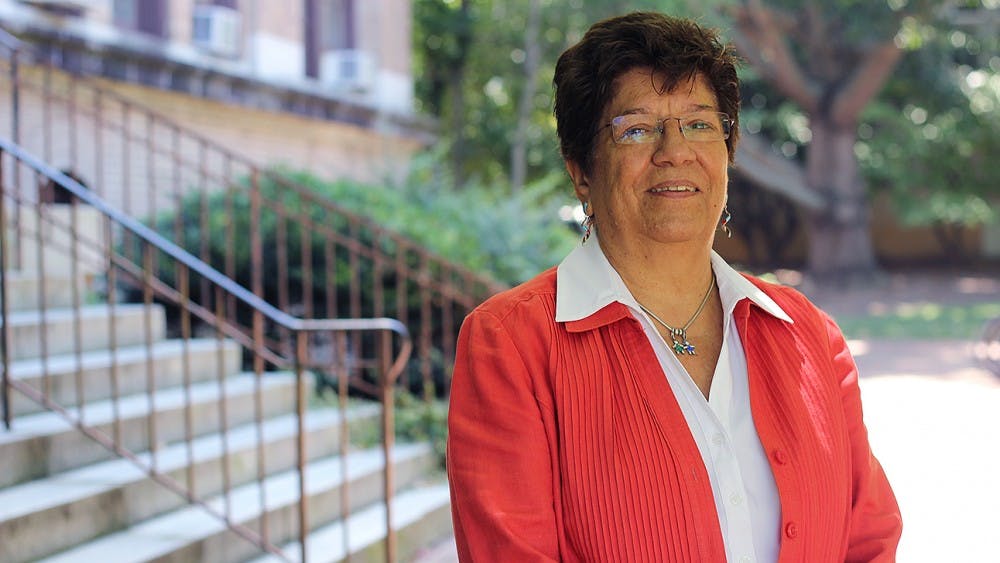“Somehow through all that she does, she has incredible skills for bringing consensus,” Desaix said.
Boxill said one of the biggest challenges she faces as faculty chairwoman is balancing the needs of each department. She said constantly monitoring the activities of every faculty member is nearly impossible.
“People think that others know more than they do, but I don’t really know much of what goes on in the history department,” she said. “I don’t know what those faculty do. I don’t really know what goes on in most departments. I just trust my colleagues.”
Thrust into the spotlight
This summer The (Raleigh) News & Observer reported that Boxill tried to water down the findings of a Faculty Executive Commit tee report on academic fraud.
But Boxill said she was made out to be a scapegoat by the newspaper — she said she listened to input from the entire 16-person committee about the findings of the report, and it was not her decision alone to change the content of the July 2012 report.
“When you only look at one slice, it’s hard to see the whole picture,” she said.
Boxill said she acted as a spokesperson for the committee and the report, which found that athletes received improper help from athletic department personnel in selecting classes from the department formerly known as African and Afro-American Studies.
She said one of the subjects of the emails which came under fire — the removal of former African and Afro-American Studies administrator Deborah Crowder’s name from the report — was a joint decision by the entire Faculty Executive Committee.
The N&O reported that the report released to former Chancellor Holden Thorp was an altered version of the original. The original report identified Crowder as an athletics supporter and the person responsible for directing athletes toward no-show classes in the AFAM department. Crowder retired in 2009.
The article said the email correspondence obtained by the N&O showed Boxill did not want to reveal Crowder’s name.
Boxill said her intent behind the language change was not to purposely avoid the attention of the NCAA, but to avoid any misunderstanding of Crowder’s motives.
To get the day's news and headlines in your inbox each morning, sign up for our email newsletters.
“Anybody that goes to a game and watches is an athletic supporter,” Boxill said.
Boxill said she was simply recounting information and feedback which was coming from the entire committee.
“I was the person who had to relay information, explain information, and I had to be the person once this report was done that had to be the spokesperson for this. So I wanted to understand from them what it was.”
Boxill said she doesn’t think the edit was important because it did not change the meaning of the report or the recommendations made. Boxill said she chose Steve Bachenheimer, Laurie Maffly-Kipp and Michael Gerhardt to write the report because she thought they were some of the most critically-minded members of the faculty council.
The Faculty Executive Committee members have written a letter of support for Boxill since the article.
“We have complete confidence in her judgment and integrity,” the letter said.
Bachenheimer said all decisions made about the wording were a team effort.
“Among the three of us it’s a collaborative effort, and since it’s a report commissioned by the full committee, the committee can weigh in with its recommendations as to editing, because in the end it’s the committee’s report,” he said.
Lingering questions
Some faculty members are still saying UNC — and other colleges nationwide — have not taken enough steps to reform athletics.
Rudi Colloredo-Mansfeld, chairman of the anthropology department, said revenue sports on college campuses have become unsustainable.
“I get worried about the expansion of the ACC, the expansion of the Dean Dome,” he said. “We’ve been growing the expanse of the sports business to cover all these costs.”
Colloredo-Mansfeld said he thinks the high school recruiting process has put so much pressure on athletes they can’t concentrate on their studies.
History professor Wayne Lee echoed those concerns, and he said money plays a central role in college sports.
“I think what happened in the scandal was a consequence between revenue, sports, and the University interacting,” he said.
Boxill said there is no easy fix to the issues surrounding athletics, but UNC is doing everything to address them.
“We know some of the things that went on,” she said.
“We’ve doing everything we can to make sure that doesn’t happen.”
university@dailytarheel.com



